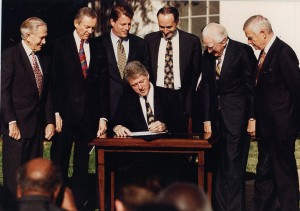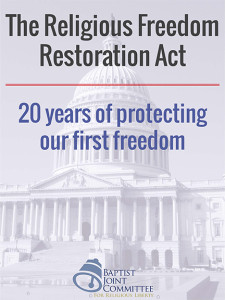The Religious Freedom Restoration Act:
20 years of protecting our first freedom

President Bill Clinton signs the Religious Freedom Restoration Act in the White House Rose Garden on November 16, 1993 (Baptist Joint Committee photo).
The Religious Freedom Restoration Act (RFRA) became law in 1993, reflecting a shared commitment to protecting the free exercise of religion in America. Twenty years later, opinions about RFRA vary, and the Baptist Joint Committee joined with others instrumental in the bill’s passage to host a symposium on religious freedom and RFRA’s impact.
“Restored or Endangered? The State of Free Exercise of Religion in America” was held Nov. 7, 2013, at the Newseum in Washington, D.C., sponsored by The Baptist Joint Committee for Religious Liberty, Christian Legal Society, American Jewish Committee, Religious Action Center of Reform Judaism, Union of Orthodox Jewish Congregations, Becket Fund for Religious Liberty and the Religious Freedom Center of the Newseum Institute.
 Read a recap of the symposium or scroll down to watch the discussions from the day’s event and a video featuring individuals who benefited from RFRA’s application.
Read a recap of the symposium or scroll down to watch the discussions from the day’s event and a video featuring individuals who benefited from RFRA’s application.
Additionally, the BJC created a special publication for the event, giving the history leading up to RFRA, a timeline surrounding its passage, a letter used to urge lawmakers to pass the bill and comments from President Bill Clinton at the signing ceremony.
Click here to view a Flickr album highlighting the day’s events, including photos from panels on the history of RFRA, future challenges to the law and the contraceptive mandate.
Continue to scroll for videos of the symposium’s panels. For more on RFRA itself, visit the BJC’s page on the legislation.
The history and impact of RFRA
Oliver “Buzz” Thomas, former BJC general counsel and the chair of the diverse “Coalition for the Free Exercise of Religion” in the 1990s, begins this segment with a keynote address on the genesis of RFRA and the coalition that worked for its passage.
His address is followed by a panel on RFRA’s history and impact, featuring leaders who worked together and found compromise to pass RFRA.
Panelists: Mark Chopko, former counsel for the U.S. Conference of Catholic Bishops; Rabbi David Saperstein, director of the Religious Action Center of Reform Judaism; and Steve McFarland, vice president of World Vision.
Moderator: BJC General Counsel Holly Hollman
[youtube video=https://www.youtube.com/watch?v=M_84dFFH8g0]
Religious freedom and the contraceptive mandate in the Affordable Care Act
Panelists:
Lori Windham, senior counsel at the Becket Fund for Religious Liberty
Daniel Mach, director of the ACLU program on Freedom of Religion and Belief
Moderator: Ira “Chip” Lupu, professor emeritus of law at George Washington University
[youtube video=https://www.youtube.com/watch?v=-7av08gCi_E&feature=youtu.be]
Current and future challenges to the exercise of religion in a diverse society
Doug Laycock, professor of law and religious studies at the University of Virginia School of Law, begins this segment with a keynote address tracing the legal history of RFRA and discussing its impact on current debates, including the contraception mandate and same-sex marriage laws.
The panel discussion that follows delves into other challenges to religious freedom, both now and in the future.
Panelists: Dahlia Lithwick, senior editor and legal correspondent for Slate magazine; Aisha Rahman, executive director of KARAMAH: Muslim Women Lawyers for Human Rights; Marc Stern, general counsel for the American Jewish Committee; and Kim Colby, senior counsel for the Christian Legal Society’s Center for Law and Religious Freedom.
Moderator: Charles Haynes, director of the Religious freedom Center of the Newseum Institute
[youtube video=https://www.youtube.com/watch?v=WtfCagMOJiA&feature=youtu.be]
“Faces of Free Exercise”
This video presentation, produced by the Becket Fund for Religious Liberty for the symposium, highlights four stories of people who have been directly impacted by RFRA and its protection of their religious exercise.
Featured in the video:
Jasjit Singh, executive director of the Sikh American Legal Defense and Education Fund
John Wimberly, former pastor at Western Presbyterian Church
Chief Johnny Jackson, hereditary chief of the Cascade Tribes of the Yakama Nation
Chief Wilbur Slockish, hereditary chief of the Klickitat Tribes of the Yakama Nation
Rabbi Dovid Goldstein, consulting rabbi at the Texas Department of Criminal Justice
[youtube video=https://www.youtube.com/watch?v=J3TbItCxWdk&feature=youtu.be]
For additional information on the Religious Freedom Restoration Act and its anniversary, check out the following resources:
The BJC’s RFRA page
BJC Executive Director Brent Walker’s reflections on the legislation, originally published in the October 2013 Report from the Capital
BJC General Counsel Holly Hollman’s retrospective on RFRA and the changes in both opinion and the legal landscape since its passage. The column was originally published in the October 2013 Report from the Capital.




